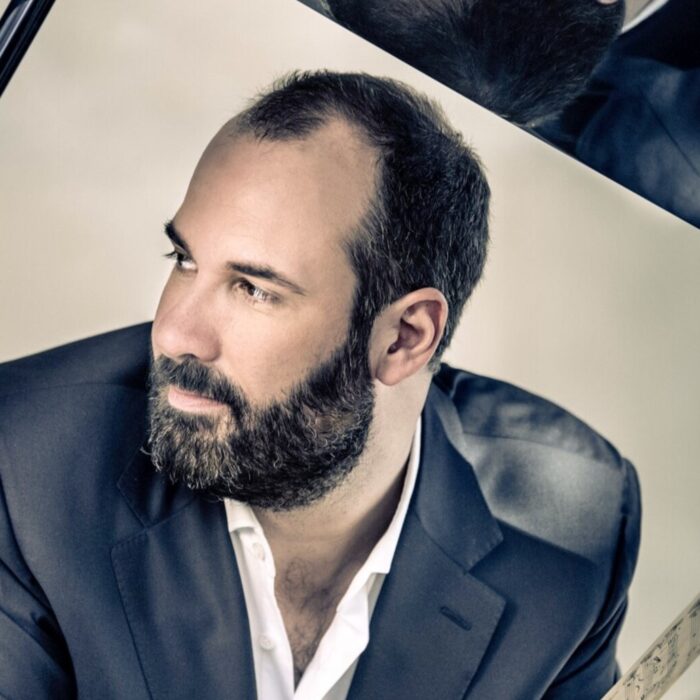Tchaikovsky’s “Iolanta” and Bartók’s “Bluebeard’s Castle” will return to the Metropolitan Opera as a double after a successful run a few seasons ago.
On first look, it seems like a strange combination with the composers’ styles rather different overall. It takes a truly strong maestro to move from Tchaikovsky’s lush lyrical qualities to Bartók’s challenging harmonic structures.
Hungarian maestro Henrik Nánási is the man tasked with embarking on this very journey this season in what will be his Metropolitan Opera debut. He is a champion of BartóK’s opera and has had a prominent career with such companies as the Teatro alla Scala, the San Francisco Opera, Komische Oper Berlin, the Royal Opera House, Covent Garden, the Bayerische Staatsoper, the Lyric Opera of Chicago, the Gran Teatre del Liceu, the Teatro dell’Opera di Roma, and the Semperoper Dresden, among many others.
Nánási recently spoke to OperaWire about his forthcoming debut and the challenges of combining these two operas into one performance.
OperaWire: How did it come about that you would be doing the double bill of Iolanta and Bluebeard’s Castle?
Henrik Nánási: For me, as a Hungarian, it is always a very special feeling to conduct Bartók. I grew up with his music, and I feel deeply connected to his musical world, human spirit, and human philosophy. When I was asked to conduct “Bluebeard’s Castle” in a double bill with Tchaikovsky’s “Iolanta,” I thought it was a terrific combination.
OW: How so?
HN: I have conducted the Bartók in several diverse combinations. I must say, for me this one at the Metropolitan Opera is the most satisfying one, because the different musical styles of the two works complement one another wonderfully, and both have common roots in fairy tales and mysteries.
OW: What are the challenges of conducting a work like “Iolanta?” What is essential to performing the music of Tchaikovsky?
HN: Tchaikovsky is a great dramatist and even more, a wonderful lyric poet. His narrative style is not purely theatrical; it is more like several pieces of poetry strung together to create the scene. This means that in addition to sensing the right timing for the dramatic moments that Tchaikovsky requires, the conductor must also pay attention to all the subtle shadings of the soul that he put into his music in a very detailed way.
OW: What are the challenges of taking on “Bluebeard’s Castle” right after? What do you place an emphasis on in presenting this work?
HN: After the bright and solemn final Ensemble of “Iolanta,” in the Bartók we have only two people, desperately trying to understand their love and relationship. We get to put a multi-dimensional mirror in front of our faces that is relevant at every age. One must feel the special dark, mysterious atmosphere right from the very first note. It is also essential to find the right balance in the sound, form, and harmonic structure. The impact of the late romantics, and of Richard Strauss’ and Debussy‘s music on the young Bartók is very strongly present in this piece.
At the same time, the importance of Hungarian folk music became more and more important in his overall composing style; not solely for its color, but as a major component of his compositional design. The biggest challenge is to combine the colorful late romantic and impressionistic styles with the simplicity and transparency of Hungarian folk music.
OW: What is your favorite moment in “Iolanta?”
HN: For me the big duet between Iolanta and Count Vaudémont is one of the most touching scenes Tchaikovsky ever wrote. It’s not a common love duet. The situation is very unusual, with Iolanta being blind, and because of that, they must go through unpredictable hurdles to reach final happiness. I love the way Tchaikovsky puts the uncertainty of the two into the music, with constant ups and downs, and huge waves of emotion.
OW: And in “Bluebeard’s Castle?”
In “Bluebeard’s Castle” it is when we get to the famous C Major section, with Bluebeard singing “Look at my spacious kingdom” and the whole orchestra is playing in a celebratory fortissimo. It’s like an earthquake.
By contrast, Judith’s reaction to that is a simple, silent, expressionless “Fair and spacious is your country.” All alone, with no orchestral accompaniment. The emotional rift is huge, with two people who love each other who could not be further apart in this moment. It’s devastating.
OW: What does it feel like to make your Metropolitan Opera debut? What excites you most about performing with the company?
HN: It is an honor and a privilege to work at the Metropolitan Opera, one of the greatest opera houses in the world. Working with this remarkable orchestra, which is of the highest musical and technical caliber, is a great pleasure, and the open-mindedness of the musicians enables us to have a very productive musical collaboration. Above all, I am working with wonderful casts for both operas; singers who are both passionate artists and exceptional singers.



